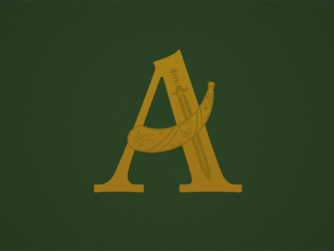The Fellowship stop at Parth Galen to rest and make the decision they’ve been putting off since Lórien: to go west to Minas Tirith, or east to Mordor. Frodo asks for an hour alone to make his decision, but Boromir (not taking the hint, or not wanting to) follows him, and manages to persuade him that he needs to get as far away from Boromir as possible. All this, plus we push the limits (again) on how many music references we can squeeze into a single podcast, and we background check Sauron’s resume to confirm his Necromancer credentials.
Recommended Reading:
Tolkien, J. R. R. The Fellowship of the Ring: Being the First Part of The Lord of the Rings (Mariner Books, paperback) pp. 386-90, “The Breaking of the Fellowship”
Tolkien, J. R. R. (Christopher Tolkien, ed.) The Silmarillion (Mariner Books, paperback)



I do wonder a bit if what Sam was hinting at was right, that Frodo’s decision was really a no-brainer. I wonder what good reasons there could be to make the decision to head with the Ring to Minis Tirith preferable to heading straight towards Mordor.
I think it is interesting to compare Isildur and Boromir WRT the Ring. Both characters were good men but both failed to resist the Ring. Isildur in particular had a nearly spotless resume and he could not destroy the Ring. How then could the lesser man Boromir possibly do better? Boromir in my opinion is a cautionary tale of the Rings power over Men. In case we needed reminding, Tolkien used the fall of Boromir to show that the Ring could not go anywhere near Gondor because of its corrupting nature. I’m not a big fan of Boromir but I think he was a good, well meaning, man that fell, got up again, and redeemed himself.
Probably also worth noting that Isildur had the Ring in his possession for a very long time (something like two years?) compared to Boromir, who was only near it and never possessed it. I think it’s amazing that Isildur held onto himself as long as he did, and remember, per the “Disaster of the Gladden Fields” in Unfinished Tales, Isildur already knew the Ring was too great for him. He was on the way to seek Elrond’s advice in Rivendell when he was waylaid and the Ring found the opportunity to get itself away from him, since he could no longer be trust.
When Boromir tells Frodo he is neither thief nor tracker, I think the latter term is dismissive of Aragorn, who has neither realm nor army at his command. He is the leading soldier in the fight against Mordor (at least in his own eyes) .
Exactly. Also, the thief reference is referring to Bilbo. Bilbo is the thief the dwarves hired and the same thief Gollum accuses of stealing the ring. However, Boromir is saying he is neither thief nor tracker, so it’s really him saying that he isn’t worthy of Aragorn’s or the Baggin’s lineage. Interestingly, he said it should go to the men of Numenor as well (Aragorn being the heir of Numenor).
If it wasn’t clear above, tracker is another word for ranger.